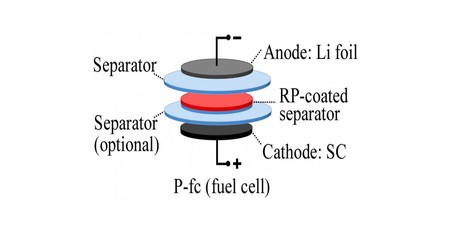Red phosphorus research makes lithium batteries safer
February 15, 2019 | 10:49
Companies: #rice-university

Researchers at Rice University have detailed a new early warning system for battery failure, protecting lithium batteries from internal shortages with a simple layer of red phosphorus.
While the majority of batteries used in laptops, smartphones, and the like today are based on lithium-ion chemistry, it's not ideal: Using lithium metal, rather than lithium ions, for a battery anode gives you a tenfold boost in storage capacity and a significant increase in charge rate. There's only one slight problem: As lithium-infused anodes are charged, they form spikes known as 'dendrites'; if one of these dendrites reaches the cathode, it creates a short which has the potential to turn the battery into an extremely effective single-use firestarter.
Previous attempts to solve this problem have centred around the addition of a third anode, but chemist James Tour argues this isn't the right approach. 'Manufacturing batteries with a third electrode is very hard,' Tour claims. 'We propose a static layer that gives a spike in the voltage while the battery is charging. That spike is a signal to shut it down.'
That static layer, built into a transparent test cell with an electrolyte known to accelerate dendrite formation, is inserted alongside one or more traditional separator. When a normal separator is penetrated by the dendrites, the battery continues as normal - right up until it shorts out; using a version coated in red phosphorous, though, the penetration triggers a voltage spike which can serve as a warning to stop charging before the dendrites are able to reach the cathode.
'As soon as a growing dendrite touches the red phosphorus, it gives a signal in the charging voltage,' Tour explains. 'When the battery management system senses that, it can say, "Stop charging, don't use."'
The team's work can be combined with an earlier breakthrough from the same lab, in which carbon nanotube films were found to halt dendrite growth, to provide additional protections against shortages. 'By combining the two recent advances, the growth of lithium dendrites can be mitigated, and there is an internal insurance policy that the battery will shut down in the unlikely event that even a single dendrite will start to grow toward the cathode,' Tour claims. 'Literally, when you make a new battery, you're making over a billion of them. Might a couple of those fail? It only takes a few fires for people to get really antsy. Our work provides a further guarantee for battery safety. We're proposing another layer of protection that should be simple to implement.'
The team's work has been published in the journal Advanced Materials as 'Detecting Li Dendrites in a Two-Electrode Battery System' by Tuo Wang, Rodrigo Villegas Salvatierra, and James Tour.

MSI MPG Velox 100R Chassis Review
October 14 2021 | 15:04








Want to comment? Please log in.